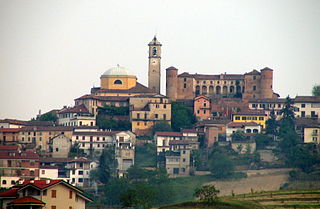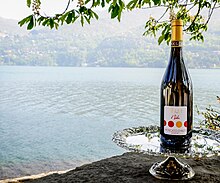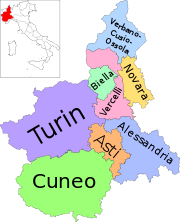
Asti is a comune (municipality) of 74,348 inhabitants (1–1–2021) located in the Italian region of Piedmont, about 55 kilometres east of Turin, in the plain of the Tanaro River. It is the capital of the province of Asti and it is deemed to be the modern capital of Montferrat.

Montferrat is a historical region of Piedmont, in northern Italy. It comprises roughly the modern provinces of Alessandria and Asti. Montferrat is one of the most important wine districts of Italy. It also has a strong literary tradition, including the 18th-century Asti-born poet and dramatist Vittorio Alfieri and the Alessandrian Umberto Eco.
Nizza is a DOCG red Italian wine produced in the northern Italian region of Piedmont. It is made from the Barbera grape, and the zone of production is limited to the comuni (municipalities) of Agliano Terme, Belveglio, Bruno, Calamandrana, Castel Boglione, Castelnuovo Belbo, Castelnuovo Calcea, Castel Rocchero, Cortiglione, Incisa Scapaccino, Moasca, Mombaruzzo, Mombercelli, Nizza Monferrato, Rocchetta Palafea, San Marzano Oliveto, Vaglio Serra and Vinchio within the province of Asti. In this area Barbera is the leading grape variety grown, because the pedoclimatic conditions here are particularly favourable for its ripening.

The province of Cuneo is a province in the Piedmont region of Italy. To the west, it borders the French region of Provence-Alpes-Côte d'Azur, to the north the Metropolitan City of Turin, to the east the province of Asti and to the south the Ligurian provinces of Savona and Imperia. It is also known as la Provincia Granda, because it is the largest province in Piedmont and the fourth-largest in Italy. Briga Marittima and Tenda were part of this province before their cession to France in 1947.

The province of Alessandria is an Italian province, with a population of some 425,000, which forms the southeastern part of the region of Piedmont. The provincial capital is the city of Alessandria.

Asti is a sparkling white Italian wine that is produced throughout southeastern Piedmont, but is particularly focused around the towns of Asti and Alba. Since 1993 the wine has been classified as a denominazione di origine controllata e garantita (DOCG) and as of 2004 was Italy's largest producing appellation. On an average vintage more than ten times as much Asti is produced in Piedmont than the more well-known Piedmontese red wine Barolo.

Santo Stefano Belbo is a comune (municipality) in the Province of Cuneo in the Italian region Piedmont, located 60 km (37 mi) southeast of Turin and 60 km (37 mi) northeast of Cuneo.

Castagnole delle Lanze is a comune (municipality) in the Province of Asti in the Italian region Piedmont, located about 50 kilometres (31 mi) southeast of Turin and about 15 kilometres (9 mi) south of Asti. As of 31 December 2004, it had a population of 3,711 and an area of 21.4 square kilometres (8.3 sq mi).

Costigliole d'Asti is a small Italian town in the Province of Asti, southern Piedmont. It lies about 13 kilometres south of the city of Asti in the Alto Monferrato, on the edge of the Langhe, in the alluvial plain of the river Tanaro southwards into the hills. The name derives from the Latin Corte Costeliolae.
Mombercelli is a comune (municipality) in the Province of Asti in the Italian region Piedmont, located about 50 kilometres (31 mi) southeast of Turin and about 12 kilometres (7 mi) southeast of Asti.

Montegrosso d'Asti is a comune (municipality) in the Province of Asti in the Italian region Piedmont, located about 50 kilometres (31 mi) southeast of Turin and about 8 kilometres (5 mi) southeast of Asti.
Rocca d'Arazzo is a comune (municipality) in the Province of Asti in the Italian region Piedmont, located about 50 kilometres (31 mi) southeast of Turin and about 8 kilometres (5 mi) southeast of Asti.
Rocchetta Tanaro is a comune (municipality) in the Province of Asti in the Italian region Piedmont, located about 60 kilometres (37 mi) southeast of Turin and about 12 kilometres (7 mi) southeast of Asti. As of 31 December 2004, it had a population of 1,454 and an area of 16.0 square kilometres (6.2 sq mi).

San Marzano Oliveto is a comune (municipality) in the Province of Asti in the Italian region Piedmont, located about 60 kilometres (37 mi) southeast of Turin and about 20 kilometres (12 mi) southeast of Asti.

Roero is a geographical area in the north-east corner of the province of Cuneo in Piedmont, north-west Italy. This hilly region is known for its wines and for its fruit production: particularly the peaches of Canale and the local variety of pear known as Madernassa which originated in the late eighteenth century in Vezza d'Alba. Strawberries are also grown.
Cortese is a white Italian wine grape variety predominantly grown in the southeastern regions of Piedmont in the provinces of Alessandria and Asti. It is the primary grape of the Denominazione di origine controllata (DOC) wines of Cortese dell'Alto Monferrato and Colli Tortonesi as well as the Denominazione di Origine Controllata e Garantita (DOCG) wine of Cortese di Gavi. Significant plantings of Cortese can also be found in the Lombardy region of Oltrepò Pavese and in the DOC white blends of the Veneto wine region of Bianco di Custoza. Cortese has a long history in Italian viticulture with written documentation naming the grape among the plantings in a Piedmontese vineyard as early as 1659. The grape's moderate acidity and light flavors has made it a favorite for the restaurants in nearby Genoa as a wine pairing with the local seafood caught off the Ligurian coast.

Piedmont wine is the range of Italian wines made in the region of Piedmont, in the northwestern corner of Italy. The best-known wines from the region include Barolo and Barbaresco. They are made from the Nebbiolo grape. These wines are ideal for storage and a well-aged Barolo for instance may leave a feeling of drinking velvet because the tannins are polished and integrated more and more into the wine. As the wine matures the colour becomes more brownish and rust-red.

























